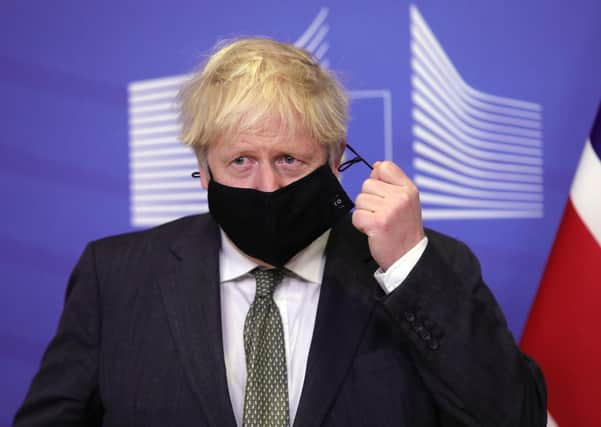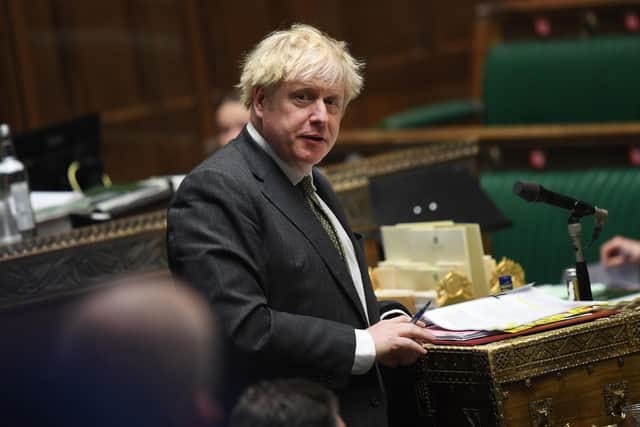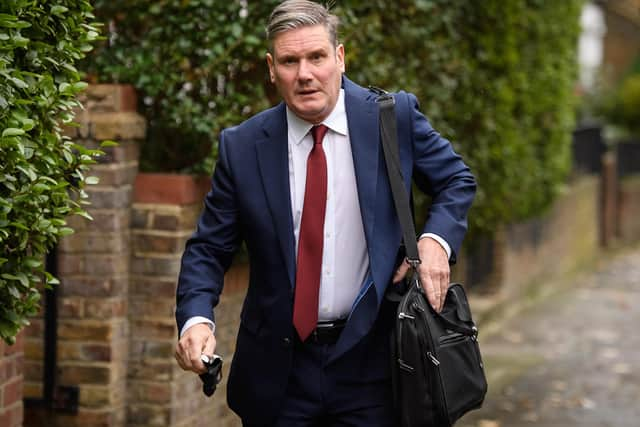Boirs Johnson’s strength is due to Labour weakness one year after election – David Blunkett


The election was undoubtedly won, at least in substantial part, by Boris Johnson’s commitment to “get Brexit done”. That, and Jeremy Corbyn.
Jeremy has, of course, now faded into the mists of time, although his legacy has not. As I write, Brexit was, at least in part, done. In the sense that in January 2020, Britain formally left the European Union, but not the single market and the customs union.
Advertisement
Hide AdAdvertisement
Hide AdSo, as the transition agreement and protocol were signed in January, providing for a transition lasting to December 31 in the hope – now unlikely – of a trade deal being signed, the world became aware of a virus that transcended national boundaries, set aside concepts of sovereignty of nation states and threatened not just the health and wellbeing of the world, but our economic prosperity.


Paradoxically, those major tech giants who benefit most from globalisation, who again make a mockery of narrow nationalism, were the ones to gain most. The Googles, the Amazons, the Facebooks, along with the fraudsters and tricksters who have manipulated the demand for essential protective equipment, have made fortunes as millions have struggled to survive.
The so-called “levelling up” agenda set out by Boris Johnson just 12 months ago has, in the face of the pandemic, transmuted into levelling down. Other than the very aged, it has been those in the most deprived areas of the country, and who had already suffered most from the impact of austerity, who have faced the greatest risk from Covid-19.
The gap between the successful and the struggling in our schools has widened. The lonely have been isolated still further and those with the most precarious jobs remain at the greatest risk of losing the little they have.
Advertisement
Hide AdAdvertisement
Hide AdWhile the major opposition in Parliament has a new leader in Sir Keir Starmer, a new Shadow Cabinet and a very different approach to politics, it is remarkable that the Conservative government does not find itself 10, 15 or 20 per cent behind in the opinion polls.


Yes, it is true, taking the poll of 2,000 people last weekend, that two-thirds of the population now believe that the Government’s handling of the pandemic has been confused and inconsistent.
Despite this, and the fact that those who voted Conservative for the first time in their lives exactly 12 months ago face the biggest risk of unemployment and further cuts to already struggling public services, there is no sign of major shift in their likely voting habits, not at least in the near future.
There are probably three major reasons for this. Firstly, and self-evidently, people are incredibly reluctant to admit that they made a mistake and, given the circumstances of the time and the then leadership of the Labour Party, it was bound to take time to win them back. Memories have to fade, and the Opposition has to offer something that is in tune with the aspiration of those who turned to Boris Johnson for salvation.
Advertisement
Hide AdAdvertisement
Hide AdCronyism, nepotism and downright incompetence in letting contracts, which has seen tens of millions of pounds going to the pockets of those with connections to the governing party, seems to have had no impact on the large swathes of voters who put the Government into office this time last year.
Of course, the intricacies of negotiation, the arguments around Northern Ireland and the Brexit protocol and the danger of genuine economic calamity in the weeks and months ahead, have to be seen, again, through the lens of what the public themselves expected.
Yet, secondly, it is probably the pandemic itself which explains why so many voters are prepared to give the Government the benefit of the doubt. They may not trust them, they may not even like them, they may understand that in comparison to any modern administration, they’re incompetent; but they sympathise.
Listen to what so many people say when asked about the Government’s performance. The immediate reaction is to indicate that we have not experienced anything quite like this outside wartime and that who else would have done better?
Advertisement
Hide AdAdvertisement
Hide AdThe emergence of vaccines – a little light at the end of the tunnel – and real hope that 2021 will be a very different experience to last year.
But thirdly there are warnings for the Opposition Party. The need for definition as to what Labour will offer in the years ahead and the ability to communicate with those turned off by the language and interests of Metropolitan London will be vital to winning people back.
One final thing. What surely all of us want is hope and optimism. A belief that tomorrow will be better, and the nightmare we are still experiencing will soon transcend into what Boris Johnson continually describes as the “sunny uplands”. For all his buffoonery, this man knows that lifting eyes to the horizon will always trump looking backwards to the misery of the immediate past.
Happy Christmas to you all and, pray God, that 2021 is better for every single one of us.
Advertisement
Hide AdAdvertisement
Hide AdDavid Blunkett is a Labour peer and a former Home Secretary. He is from Sheffield.
Support The Yorkshire Post and become a subscriber today. Your subscription will help us to continue to bring quality news to the people of Yorkshire. In return, you’ll see fewer ads on site, get free access to our app and receive exclusive members-only offers. Click here to subscribe.
Comment Guidelines
National World encourages reader discussion on our stories. User feedback, insights and back-and-forth exchanges add a rich layer of context to reporting. Please review our Community Guidelines before commenting.